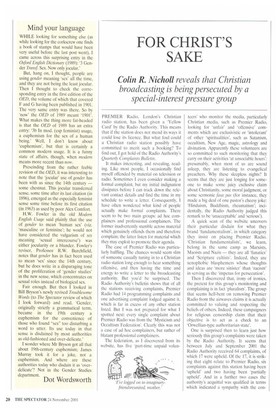Mind your language
WHILE looking for something else (as while looking for the corkscrew one finds a book of stamps that would have been very useful before the last post went), I came across this surprising entry in the Oxford English Dictionary (1989): '3 Gender Transf. Sex. Now only jocular.'
But, hang on, I thought, people are using gender meaning 'sex' all the time, and they are not being the least jocular. Then I thought to check the corresponding entry in the first edition of the OED, the volume of which that covered F and G having been published in 1901. The very same entry was there. So by 'now' the OED of 1989 meant '1901'. What makes the thing more fat-headed is that the OED of 1989 has an extra entry: `3t) In mod. (esp feminist) usage, a euphemism for the sex of a human being.' Well, I don't know about 'euphemism', but that is certainly a common modern usage. It is a funny state of affairs, though, when modern means more recent than now.
Prescinding from the rather feeble revision of the OED, it was interesting to note that the 'jocular' use of gender has been with us since the 14th century — some chestnut. This jocular transferred sense, some time after its last citation (in 1896), emerged as the especially feminist sense some time before its first citation (in 1963) as used by poor Alex Comfort.
H.W. Fowler in the old Modern English Usage said plainly that the use of gender to mean 'human sex' (viz. 'masculine or feminine'; he would not have considered the vulgarism of sex meaning 'sexual intercourse') was either jocularity or a blunder. Fowler's reviser, Professor R.W. Burchfield, notes that gender has in fact been used to mean 'sex' since the 14th century, but he does write in a disparaging tone of the proliferation of 'gender studies' in the new sense, which concentrates on sexual roles instead of biological sex.
Fair enough. But then I looked in Bill Bryson's newly revised Troublesome Words (to The Spectator review of which I look forward) and read, 'Gender, originally strictly a grammatical term, became in the 19th century a euphemism for the convenience of those who found "sex" too disturbing a word to utter. Its use today in that sense is disdained by most authorities as old-fashioned and over-delicate.'
I wonder where Mr Bryson got all that about 19th-century euphemism; James Murray took it for a joke, not a euphemism. And where are these authorities today who disdain it as 'overdelicate'? Not in the Gender Studies department.
Dot Wordsworth


















































































 Previous page
Previous page